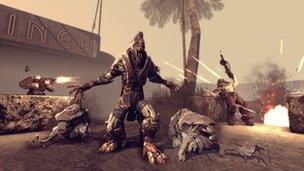Gears Of War boss defends violence
- Published

The latest instalment of the Gears of War trilogy will be released in 2011
The creator of the successful Xbox video games series Gears of War has defended the use of violence in his video games.
Cliff Bleszinski, lead designer at Epic Games, argues that brutality is depicted with an element of fantasy.
The third person shooter revolves around the efforts of soldier Marcus Fenix as he helps combat a race of aliens on the planet of Sera.
"When we create our games we use a slapstick type of violence, we poke each other in the eyes and hit each other with frying pans like the old Warner Brothers cartoons," he told The Interview on the BBC World Service
"It's funny because the industry sometimes comes under fire from watchdog groups with regard to this sort of violence.
"But we always believe that when we first see this muscular space marine beating down a lizard man and heads explode with water melon guts spewing out of them, you're morally inclined to smile and giggle rather than be revolted."
His comments come during a week when a case was held in the US Supreme Court over whether children should be stopped from buying violent video games.
The case centres on a ban in California on selling or renting games to those under the age of 18.
Opponents claim it breaches the First Amendment guarantee of freedom of speech but supporters argue the law is necessary as violent games can cause harm to children.
But Bleszinski pointed out that the level of violence in their video games is carefully monitored and vetted.
"We have an internal moral compass where we will decide, 'No that's a little bit too much,' or we need to cut the violence back a little bit," he explained.
"So there's still ways of showing violence to an affecting user without showing too much."
Inspired series
Rather than encouraging brutality in video games, the Gears of War creator believes the series focuses more on creating an interactive world for the user.
"The majority of what we implement into the game we do for feedback and interactivity, not because we're strange sadistic people who want to see how much blood we can put on the screen when you shoot one of the lizard creatures.
"We do it to let the player know you did in fact succeed, that you are hitting a target and you need that kind of feedback in order to create what is a successful interactive experience."
The Gears of War trilogy, part three of which is out in April 2011, is a hugely successful franchise with the first part alone scoring sales of three million within 10 weeks of its release in 2006.
Bleszinski revealed that the series was inspired by his love for 80s action movies.
"The franchise is a bit of a throw back to the lost 80s era of manly men with movies like Predator and Aliens.
"We have embraced that while at the same having very interesting themes about loss and the actual prices of war."
Next generation
Similarly he argues that Hollywood has taken a huge interest in video games in recent years.
"I think it has taken more notice, you've got more films that are video game adaptations and you're seeing their influence more in movies," he said.
"You go and see the last Wolverine movie [X-Men Origins: Wolverine] and it kind of feels like a giant mortal combat experience."
Looking to the future, Bleszinski believes the next generation of video gamers will be able to interact socially on a variety of platforms both in and out of the home.
"I think we're heading towards a connected world," he added.
"Video game consoles might be like the iPad where you take it to the pub and play a simpler version of the game.
"Then when you come back home, you plug it into a docking station which pops up on your large TV and you take out your traditional controller and play it that way.
"Then this connects to people's mobile phones so you have a social element. You're basically creating what is essentially a second life for users who want to seek out a fantasy world."
- Published16 July 2010
- Published15 June 2010